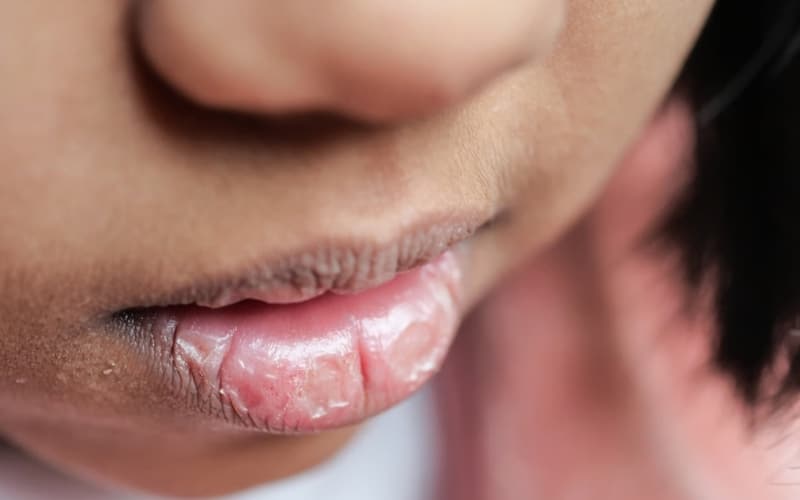New Patients Welcome!

Dry mouth, also known as xerostomia, isn’t just an annoying feeling – it can affect your speech, taste, and even your oral health. While the causes can vary, from certain medications to underlying health conditions, there are ways to manage dryness and find relief. One simple strategy? Choosing the right foods! This blog delves into the world of dry-mouth-friendly foods, offering a delicious list of options to keep your mouth feeling comfortable and hydrated. We’ll explore the benefits of each food category and provide tips for incorporating them into your diet.
Understanding Dry Mouth: Causes and Oral Health Effects
Dry mouth, medically known as xerostomia, occurs when the salivary glands in your mouth fail to produce enough saliva. Saliva plays a crucial role in maintaining oral health by:
- Lubricating the mouth: It keeps your mouth moist, allowing for comfortable talking, swallowing, and tasting.
- Neutralizing acids: Saliva helps neutralize the acids produced by bacteria in your mouth, preventing tooth decay and gum disease.
- Washing away bacteria: Saliva helps wash away food particles and bacteria, cleansing your mouth and preventing the buildup of harmful microorganisms.
Causes of Dry Mouth
Several factors can contribute to dry mouth, broadly categorized into:
Dehydration: This is the most common cause. Insufficient fluid intake, excessive sweating due to exercise or hot weather. Also, certain medications like diuretics can lead to dehydration and decreased saliva production.
Medical Conditions: Certain medical conditions can affect the salivary glands or their function, causing dry mouth. Examples include:
- Sjögren’s syndrome: An autoimmune disorder attacking the salivary glands.
- Diabetes: Can damage the nerves and blood vessels supplying the salivary glands.
- HIV/AIDS: It may affect the salivary glands.
- Alzheimer’s disease: This can cause difficulties with swallowing, leading to dry mouth.
Lifestyle Habits: Certain habits can contribute to dry mouth, such as:
- Smoking and tobacco chewing: Reduce saliva production and irritate the mouth.
- Alcohol consumption: Dehydrates the body and dries out the mouth.
- Caffeine intake: While not directly causing dry mouth, excessive coffee or tea can contribute to dehydration.
- Breathing through your mouth: Bypasses the natural humidification process in the nose, drying out the mouth.
Effects of Dry Mouth on Oral Health
Dry mouth can have several negative consequences for your oral health, including:
- Increased risk of tooth decay: Reduced saliva flow weakens the mouth’s natural defenses against cavity-causing bacteria.
- Gum disease: A dry mouth can contribute to gingivitis (gum inflammation) and periodontitis (gum disease), as saliva helps remove harmful bacteria that can irritate and inflame the gums.
- Thrush: A fungal infection in the mouth that can thrive in a dry environment created by dry mouth.
- Cracked lips and mouth sores: Dryness can cause cracks in the corners of the mouth and discomfort.
- Difficulty speaking and swallowing: Dryness can make it difficult to talk, chew, and swallow.
- Bad breath: Reduced saliva flow can lead to bad breath (halitosis) due to the buildup of bacteria and food particles in the mouth.
Foods to Eat
The Hydration Heroes: Foods with High Water Content
When battling dry mouth, it’s all about staying hydrated. Luckily, several delicious options naturally pack a punch of water.
- Fruits and Vegetables: They’re nature’s water pouches! Opt for juicy choices like watermelon, cantaloupe, cucumber, celery, and berries. These provide a refreshing burst of flavor and hydration.
- Soups and Stews: Warm or cold, these brothy beauties add moisture and essential nutrients to your diet. They’re also easy to chew and swallow, making them a perfect choice for those struggling with dryness.
The Soft Squad: Foods for Easy Chewing and Swallowing
A dry mouth can make chewing and swallowing difficult. The following foods come to the rescue, offering a smooth and effortless experience:
- Yogurt: Plain yogurt, both Greek and regular, is a fantastic source of calcium and protein, essential for overall health. Add a touch of honey or fruit for extra flavor and sweetness.
- Scrambled Eggs: This classic breakfast staple is soft, easy to swallow, and packed with protein. Add chopped vegetables like spinach or tomatoes for a nutrient boost.
- Mashed Potatoes: Creamy and comforting, mashed potatoes provide essential carbohydrates and are gentle on the mouth. Experiment with different herbs and spices to add variety.
- Smoothies: Blend your favorite fruits, yogurt, and even leafy greens to create a delicious and hydrating smoothie. This is a great way to pack in essential nutrients on the go.
The Flavorful Fighters: Foods that Stimulate Saliva Production
While staying hydrated is key, certain foods can also stimulate saliva production, offering additional relief from dryness.
- Sugar-Free Gum and Candy: Chewing sugar-free gum or sucking on sugar-free candy can help increase saliva flow. Choose options with xylitol, an ingredient known to promote oral health.
- Citrus Fruits: Citrus fruits like oranges, grapefruits, and lemons taste refreshing and contain citric acid. This can stimulate saliva production. However, be mindful of the acidity, which can irritate some individuals with dry mouth.
Beyond the Bite: Additional Tips for Managing Dry Mouth
While dietary choices hold great power in managing dry mouth, your journey continues. Here’s a treasure chest of additional tips to bring long-lasting relief and keep your mouth feeling fresh and comfortable:
Stay Hydrated
Sip water consistently throughout the day, even if your thirst doesn’t roar. Aim for eight glasses daily, but remember, this is a baseline. Adjust according to your individual needs and activity level. Listen to your body; on hot days or during exercise, increase your intake to stay replenished.
Limit Caffeine and Alcohol
While that morning cup of joe might be tempting, remember that caffeine acts as a diuretic, drawing fluids out of your body and intensifying your dry mouth. Opt for herbal teas or water flavored with fruits or herbs. If you can’t ditch coffee entirely, try limiting your intake and gradually reducing the amount over time.
Quit Smoking
Smoking not only harms your overall health but also dries out your mouth and irritates your oral tissues. Quitting smoking offers a multitude of benefits, including significantly improving oral health and alleviating dry mouth symptoms. If you’re struggling to quit, talk to your doctor about available resources and support systems.
Use a Humidifier
Dry air can contribute to dry mouth. Using a humidifier, especially at night, adds moisture to the air, helping combat dryness in your mouth and nasal passages. This can provide much-needed relief, especially during dry winter months or in areas with naturally dry climates.
Living with a dry mouth doesn’t have to be a flavorless struggle. By incorporating the foods and tips mentioned above, you can create a personalized strategy to manage dryness and enjoy a comfortable, healthy mouth. Remember, it’s beneficial to consult with your dentist in Ventura, CA for personalized advice. Embrace the culinary possibilities with confidence, knowing that there are delicious options available to keep your taste buds satisfied and your mouth feeling refreshed!



